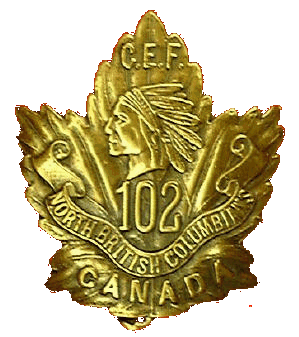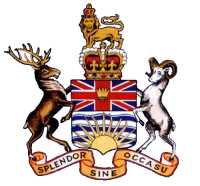






The Story of the 102nd Canadian Infantry Battalion
From BC to Baisieux by Sgt Leonard McLeod Gould HQ 102nd Canadians WW1







The Story of the 102nd Canadian Infantry Battalion
From BC to Baisieux by Sgt Leonard McLeod Gould HQ 102nd Canadians WW1
Six Weeks in England.
Our journey across the Continent was unmarked by any untoward incident.
Accommodation was good on board the train and the messing arrangements were excellent. Two trains, the first being under the command of Major Worsnop and the second under that of the Colonel.
Two stops a day were made of sufficient duration to enable the men to get exercise by parading through the main streets of some town and it was not until we reached Ottawa that any event occurred to break the usual monotony of a long train journey. At the Capital the battalion was reviewed by H.R.H. the Duke of Connaught, then Governor-General of Canada, accompanying whom was General Sir Sam Hughes, then Minister of Militia. On the same day the journey was resumed and on Sunday afternoon, June 18th, we reached Halifax and embarked on the C.P.R. S.S. "Empress of Britain," which pulled out into the fairway on the same evening, but did not leave Halifax until the morning of June 20th, when, with H.M.S. "Drake" as escort, she started off upon her submarine infested course.
Of that voyage the less said the better, but common decency demands that some criticism be offered on the accommodation afforded the troops. In addition to the 102nd Bn. the steamer carried the 65th and 84th Bns., together with some Medical Details and a draft for the Pioneers. It was freely stated that in the Mediterranean the "Empress of Britain" had carried 6,000 troops; if that were so, she must indeed have been a living hell. With only two-thirds that number on board the conditions that prevailed were well-nigh intolerable, and this is written after two and a half years in France and Belgium where the writer had some experience Of hardship. The 102nd Bn. was the junior battalion and the last aboard, but that should not account for the fact that there was literally not sufficient accommodation for all below and that, if the weather had been bad, so that men could not have slept on deck, there would have been no place for them to sleep at all.
The food was atrocious. Apart from the fact that we had to eat in the bowels of the ship where the atmosphere was stifling, every article of food cooked was permeated with some disgusting preservative which caused all dishes to taste alike, all being equally objectionable.
Fortunately the weather was gloriously fine and the sea as calm as a duck pond throughout the voyage. Imagination fails at the conditions which would have prevailed had sea sickness been prevalent instead of non existent. Just exactly how many submarines were observed when nearing the Irish Coast no historian could compute; probably each man saw three, but as the official records relate that none were in evidence it is unlikely that we were ever in very great danger, in spite of the numerous hair's breath escapes which were narrated after disembarkation.
On the evening of June 28th Liverpool was reached but the steamer anchored over-night in the Mersey and it was not until the following morning that the troops disembarked and lined up on the wharf. A tedious period of waiting then followed and it was afternoon before we boarded trains which conveyed us over nearly every railway system in England to our destination, Bordon, where we arrived at one o'clock on the morning of the 30th. It was pouring rain when we fell in on the station platform, but we were lucky in our quarters, which were in the married men's huts in Bordon and were both clean and comfortable.
The first days of our stay in England were anxious ones indeed; right and left of us we saw battalions being broken up; both the 65th and the 84th Bns. with whom we had come overseas suffered this fate on the very next day after arrival, and we were the junior battalion in England at the time. What mercy could we expect? Well, we did not get mercy, but we got justice, and when the authorities found out that we were the tallest, the heaviest, and the most maturely aged of any unit that had reached England, and when they saw for themselves the physique of the men who composed the 102nd Bn. They just naturally had no choice in the matter and within two or three days we received the glad news that we were no longer under the special care of Broxted House, that wet nurse of newly arrived units, but that we had brigaded and henceforth were the junior battalion in the 11th Brigade, 4th Canadian Division, commanded respectively by Brig.-General V.W.Odlum, D.S.O., and Major-General D. Watson, C.M.G.. Our future was assured.
But there was a tremendous amount of work ahead of us in England, and but little time to do it in. The Fourth Division was expected to proceed to France very shortly and we had to do in six weeks what our sister battalions had taken months to accomplish. Musketry, of course, was our first and most pressing need and as soon as we had been issued with rifles many days were spent at Whitehill in passing the various tests. Then there were long hours to be spent on bayonet fighting and on musketry drill, but before the end of the month our musketry was over and we left Bramshott to take up our place by the side of the three battalions with whom we were to be associated for so many arduous months abroad, the 54th (Kootenay) Bn.; the 75th (Toronto) Bn., and the 87th (Montreal) Bn.. The remaining days at Bramshott were spent mostly in continuous drill, the only leave obtainable being two short week ends, one of which was cut shorter by the desire of Sir Sam Hughes to inspect the 4th Division before his departure to Canada. We surely did love our Minister of Militia when this news came through.
In connection with this review justice demands that a tragedy be related and if at this late date exposure could cause the lopping off of a few official heads there are many 102nd men now living who would indeed feel that "God's in His heaven; all's right with the world."
We were on the eve of departure and orders were issued that all private or Governmental property carried by the men which would not be taken overseas was to be packed in the men's individual kit-bags; these kit-bags were to be clearly marked with name and number and piled at a specific place. It was clearly stated that these kit-bags would be stored under Government care and that when on leave in after months men would be able to reclaim their kit-bags and possessions. In pursuance of these orders kit-bags were packed and piled as directed, and the battalion marched away to parade with the Division at the grand review. During its absence a party of men acting under orders went through the kit-bags and burnt or distributed to pedlars all the contents. Absolutely unworn Stanfield's underwear, boots, spare socks and other wearing apparel were either wantonly burnt or given away; that was a shameful waste of public money and an economic outrage. In addition, the private property of the men was burnt, bibles, keepsakes from relatives and all the variety of personal effects which most men carry round with them, were consigned to the flames; that was a damnable vandalism and an outrage on the feelings of God and man alike. Someone must have blundered; the act was worse than criminal; it was foolish; but the Army is past-master in the art of "passing the buck" and to this day the responsibility for this wholesale destruction has never been disclosed officially. Nothing could be done then, nor can anything be done now to compensate the men for the sentimental losses they sustained; but it is never too late for the Government to recover the monetary value of good under-clothing wantonly destroyed.
Reference was made above to leave. The 102nd Bn. was unfortunate in its King's leave. Whilst at Comox frequent weekend leave was granted to Vancouver, Victoria and places near-by, but when our sudden departure was announced there was no opportunity for men to get leave who lived far away. "Never mind," said the Colonel; "my men are all British-born, and their relations are in England. They'll get leave over there." One cannot blame the Colonel; we were all keen to get away, and a demand for leave would have robbed us of the chance. But mark well what happened. We reached England, in time to join the 4th Division, if we could make the grade; but this would be impossible if each man was to have his King's leave. They are Canadians and have already said good-bye to their kith and kin." Again, one can't blame the Colonel; we all wanted to get across to France, but he was scarcely logical, to say the least of it.
During the six weeks spent in England considerable change was made in the personnel of the battalion. A rigorous medical inspection resulted in the transfer of every man who was not in the pink of condition to a reserve unit; thus we lost many who were not considered fit for the strenuous work of the front line, though eminently capable of fulfilling essential duties which did not call for physical perfection. The officers left behind when the battalion proceeded to France were Major L. A. Hagar, Capt. J. H. Ross, Capt. J. Fall, Lieut. G. B. Proctor and Capt. T. C. Colwell. At Bramshott also we lost the majority of our Bugle Band, which was for the most part composed of boys under age who were later returned to Canada, only to come out again when Time had made them eligible. Many boys, however, who nobly "got away" with their age, accompanied the unit across the Channel and proved invaluable as Runners. To fill up the deficiencies in our numbers we received the following reinforcements while at Bramshott: Capt. J. G. Spencer and 27 O.R. from the 71st Bn.; Capt. W. J. Loudon, Capt. R. W. Nicholls, Capt. A. C. Trousdale and 112 O.R. from the 74th Bn.; Capt. E. J. Gook; Lieuts. C. C. Tunnard, R. Fitzmaurice, L. J. Bettison, C. T. Rush and T. E.Dent from the 11th C.M.R., and Lieuts. W. S. Barton and W. Bell from the 103rd Bn. Capts. A. T. Johnston, J. S. Matthews and, H. E. Homer Dixon received promotion in England and the first named took over No. I Co. in place of Capt. Fall, Major Homer Dixon assuming command of No. 2 Co. Lieut. J. H. Grant was appointed Assistant Adjutant in place of Lieut. R. A. Stalker who had succeeded Lieut. J. E. Bailey. Capt. I. J. E. Daniel proceeded with the battalion as Chaplain (R:C.) in place of Capt. Colwell.
The last few days passed quickly, and finally, on a sweltering hot day, August 11th, 1916, the 102nd Bn. marched from Bramshott to Liphook, where it entrained for Southampton. Arrived there we boarded the small cross-channel transport "Connaught" and awoke on the morning of the l2th to find ourselves in the harbour of Le Havre. Just five months from mobilization in Comox and we were standing on the threshold of our ambitions. How those ambitions were fulfilled the succeeding chapters will relate.
BATTLE HONOURS
"SOMME, 1916", "Ancre Heights", "Ancre, 1916", "ARRAS, 1917, 18", "VIMY, 1917", "Hill 70", ", 1917", "PASSCHENDAELE", "AMIENS", "Scarpe, 1918", "Drocourt-Queant", "HINDENBURG LINE", "CANAL du NORD", "VALENCIENNES", "France and Flanders, 1916-18".
Be sure and visit the 102nd Battalion`s Sister Unit - the 54th Kootenay Battalion
Visit the 21st Battalion from Eastern Ontario